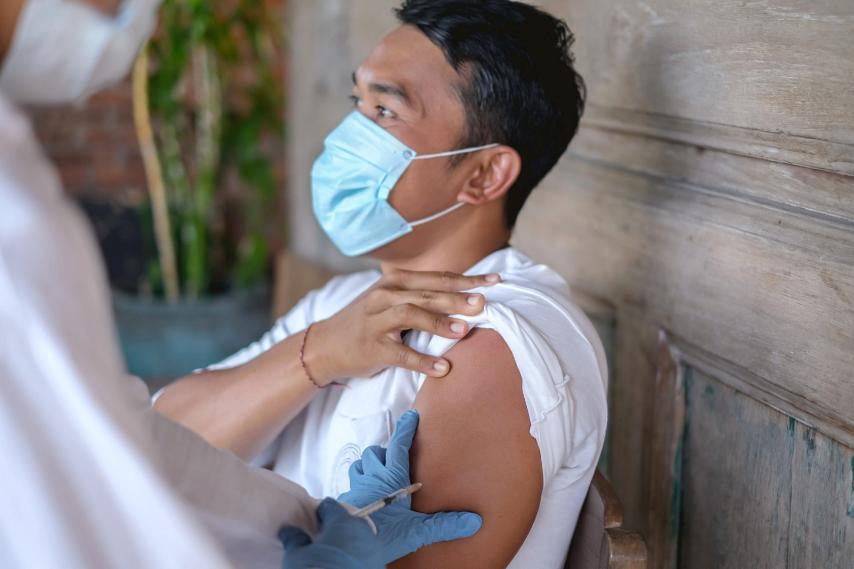Despite a record global dengue spike of 5 million cases and over 5,000 deaths in 2023, the Department of Health (DOH) reported a decline in the number of dengue cases and deaths in the Philippines than the previous year. This can be attributed to the driest rainy season in recent history, with studies confirming the link between low rainfall and decreased mosquito-borne diseases.
As the new year unfolds, the unsettling reality of dengue looms over the country. With the onset of increased rainfall, creating favorable breeding conditions for mosquitoes, the risk of dengue transmission escalates. The devastating outbreak in 2019 serves as a stark reminder of the devastating impact that dengue can have on affected populations. The unpredictable nature of this disease shall continue to pose a significant challenge to public health authorities and communities alike.
On Track for Disaster
Under distressingly dry conditions, the dengue incidence during the first quarter of 2023 has reached alarming heights, exhibiting a staggering 94% surge when compared to the corresponding period in 2022. This surge is particularly concerning as the first quarter is typically characterized by dry weather, which traditionally sees lower dengue cases compared to the peak of the rainy season.
The implications of this sharp increase in dengue cases are deeply troubling. Had the Philippines encountered a typical rainy season, the nation could have been confronted with an unprecedented dengue pandemic, mirroring the devastating situations witnessed in other countries within the Dengue belt.
This sobering truth serves as a poignant reminder of the vulnerability we encounter in the ongoing struggle against dengue. The prevailing dry conditions have inadvertently fostered an environment that facilitates the proliferation of disease-carrying mosquitoes, thereby intensifying the risk of transmission and its subsequent repercussions on public health.
Amidst a backdrop of extreme weather events, the year 2023 unfolded as a harrowing chapter in the annals of dengue-related fatalities across Asia, plunging the lives of many into a state of disarray, especially children. The toll on children extends far beyond their role as victims of this merciless disease, encompassing the disruption of their education, heightened economic and emotional burdens on their families, and the heart-wrenching loss of caregivers who succumb to the illness. Shockingly, children aged 9 and below have historically accounted for a distressing half of all dengue-related deaths.
In 2019, the Philippines bore witness to a grim milestone, with over a thousand lives claimed by dengue as early as September, nearly half of which were innocent children aged between 5 and 9. This staggering figure represented a fifth of the global death toll in 2023. If the trajectory of that devastating year had persisted, the impact of the 2019 epidemic could have been eclipsed, casting an even darker shadow over the fate of our vulnerable population.
Credit where Credit is Due
In response to the alarming dengue numbers last year, the national government and various local government units in the Philippines took action to combat the Dengue outbreak. In April 2023, the Department of Health (DOH) called on citizens to be vigilant and adhere to the government’s 5S program: Search and destroy mosquito breeding sites, secure self-protection measures, seek early consultation, support fogging and spraying in hot spot areas, and sustain hydration. This strategy was implemented and reiterated by various local government units (LGUs), including the City of Tagum which was recently placed under a state of calamity. Local officials, including Tagum City Health Officer Dr. Arnel Florendo emphasized the importance of these measures in eliminating mosquito breeding grounds. Florendo also reminded citizens of the importance of preventive measures such as using repellents, mosquito nets, installing screens in homes, and conducting regular clean-up drives to protect themselves from mosquito bites and eliminate breeding grounds.
The alarming increase of dengue cases in several areas is prompting all LGUs to act now and act fast in arresting the spread of dengue in their respective areas. For an example, government agencies and healthcare providers in the Zamboanga Peninsula (ZamPen) region have assumed a pivotal role in the ongoing battle against dengue, following the DOH’s report of a total of 7,491 dengue cases recorded from 1 January to 12 August in Region 9. With a focus on prompt and effective intervention, hospitals and clinics in the region have fortified their capacity to swiftly diagnose and treat dengue cases, ensuring that patients receive timely medical attention. Simultaneously, these institutions have actively embarked on comprehensive public education initiatives, diligently raising awareness among residents about the telltale signs of dengue and the critical significance of seeking early medical intervention.
This only goes to show that in a concerted effort to curb the spread of dengue, local government units have intensified their commitment to controlling the mosquito population. Regular vector control activities, including targeted fogging operations in high-risk areas, are being conducted with heightened vigilance. These proactive measures are aimed at curtailing the transmission of dengue and minimizing its impact on the community.
The Elephant in the Room
Despite the implementation of the 5S strategy, which has contributed to a reduction in Dengue cases and fatalities, there is still significant room for improvement in addressing the Dengue situation in the Philippines. While the country managed to avoid a major outbreak compared to other nations in the record-setting year of 2023, the World Health Organization (WHO) has reported a death toll of 575 in the country as of 19 October, making it the third highest globally.
The challenge lies in the lack of specific measures to directly prevent and treat Dengue. While the 5S strategy focuses on eliminating mosquito breeding sites, it may not directly address the prevention and treatment of the disease itself. This highlights the need for comprehensive measures that encompass vector control, effective diagnosis, treatment, and public awareness campaigns.
To address this issue, it is crucial to invest in research and development for new prevention methods, such as vaccines, and to strengthen healthcare systems to ensure prompt and appropriate treatment for Dengue cases.
A recent second-generation dengue vaccine that has been approved for use in more than 30 countries but yet to be introduced in the Philippines has demonstrated higher efficacy in preventing dengue. The introduction of this second-generation vaccine could potentially be a significant step forward in the fight against dengue in the Philippines.
In the ongoing battle against Dengue, the integration of vaccination into the comprehensive management and control strategies in the Philippines holds immense potential. Vaccination can serve as a vital tool in the fight against Dengue, complementing existing measures and contributing to the reduction of Dengue incidence and its associated burden.
During a recent interview with BioPHARMA APAC, Dr. Lulu Bravo, President of the Immunization Partners in Asia Pacific (IPAP), and Current Executive Director of the Philippine Foundation for Vaccination mentioned that the introduction of the second-generation dengue vaccine has sparked renewed positive discussions on dengue prevention. She emphasized that the uptake of the vaccine is increasing among the public, and with ongoing education campaigns and effective communication, Filipinos are getting closer to achieving the objective of zero dengue deaths by 2030.
The contrasting impact of specific measures such as vaccines versus indirect methods is evident in the incidence of Malaria in the Philippines. Malaria, with the availability of effective drugs and treatments, has been successfully controlled, reporting only 4,777 cases and no fatalities as of September 2023. In contrast, even during a relatively slow year for Dengue, there were 167,355 cases and 575 deaths.
The experience with COVID-19 has demonstrated the transformative impact of vaccination in controlling the spread of a contagious virus. The introduction of COVID-19 vaccines in the Philippines has led to a remarkable decline in cases and deaths, underscoring the importance of widespread immunization campaigns. This success story serves as a powerful reminder of the potential benefits that vaccination can bring in combating infectious diseases.
Drawing parallels to other diseases, such as Malaria, further emphasizes the significance of targeted interventions. Specific measures tailored to the unique characteristics of a disease can yield more effective outcomes. By adopting strategies specific to Malaria and COVID-19, which have shown promising results, the Philippines can apply similar targeted approaches to tackle the growing threat of Dengue.
With the increasing prevalence of Dengue locally and globally, it is crucial to take proactive measures to prevent a potential health crisis in 2024. The current situation calls for a comprehensive and multifaceted approach that encompasses not only vector control measures but also the integration of vaccination as a key component of Dengue management and control.
*This information is available to the public for information purposes only; it should not be used for diagnosing or treating a health problem or disease. It is not intended to substitute for consultation with a healthcare provider. Please consult your healthcare provider for further advice.














